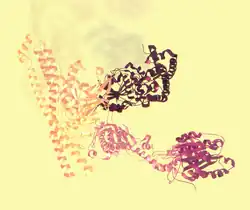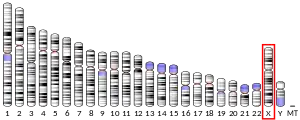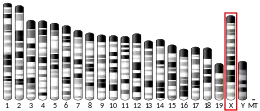BRCC3
Lys-63-specific deubiquitinase BRCC36 is an enzyme that in humans is encoded by the BRCC3 gene.[5][6][7]
Function
This gene encodes a subunit of the BRCA1-BRCA2-containing complex (BRCC), which is an E3 ubiquitin ligase. This protein is also thought to be involved in the cellular response to ionizing radiation and progression through the G2/M checkpoint. Alternative splicing results in multiple transcript variants.[7]
Repair of DNA damage
BRCC36, the protein product of the BRCC3 gene, is a deubiquitinating enzyme and a core component of the deubiquitin complex BRCA1-A.[8] BRCA1, as distinct from BRCA1-A, is employed in the repair of chromosomal damage with an important role in the error-free homologous recombinational (HR) repair of DNA double-strand breaks. Sequestration of BRCA1 away from the DNA damage site suppresses homologous recombination and redirects the cell in the direction of repair by the process of non-homologous end joining (NHEJ).[8] The role of BRCA1-A appears to be to bind BRCA1 with high affinity and withdraw it away from the site of DNA damage to the periphery where it remains sequestered, thus promoting DNA repair by NHEJ in preference to HR.
Interactions
BRCC3 has been shown to interact with BRE,[6][9] BRCA2,[6] RAD51,[6] BRCA1,[6] P53[6] and BARD1.[6]
References
- GRCh38: Ensembl release 89: ENSG00000185515 - Ensembl, May 2017
- GRCm38: Ensembl release 89: ENSMUSG00000031201 - Ensembl, May 2017
- "Human PubMed Reference:". National Center for Biotechnology Information, U.S. National Library of Medicine.
- "Mouse PubMed Reference:". National Center for Biotechnology Information, U.S. National Library of Medicine.
- Kenwrick S, Levinson B, Taylor S, Shapiro A, Gitschier J (Jun 1992). "Isolation and sequence of two genes associated with a CpG island 5' of the factor VIII gene". Human Molecular Genetics. 1 (3): 179–86. doi:10.1093/hmg/1.3.179. PMID 1303175.
- Dong Y, Hakimi MA, Chen X, Kumaraswamy E, Cooch NS, Godwin AK, Shiekhattar R (Nov 2003). "Regulation of BRCC, a holoenzyme complex containing BRCA1 and BRCA2, by a signalosome-like subunit and its role in DNA repair". Molecular Cell. 12 (5): 1087–99. doi:10.1016/S1097-2765(03)00424-6. PMID 14636569.
- "Entrez Gene: BRCC3 BRCA1/BRCA2-containing complex, subunit 3".
- Rabl, J. (2020). "BRCA1-A and BRISC: Multifunctional Molecular Machines for Ubiquitin Signaling". Biomolecules. 10 (11): 1503. doi:10.3390/biom10111503. PMC 7692841. PMID 33142801.
- Ewing RM, Chu P, Elisma F, Li H, Taylor P, Climie S, McBroom-Cerajewski L, Robinson MD, O'Connor L, Li M, Taylor R, Dharsee M, Ho Y, Heilbut A, Moore L, Zhang S, Ornatsky O, Bukhman YV, Ethier M, Sheng Y, Vasilescu J, Abu-Farha M, Lambert JP, Duewel HS, Stewart II, Kuehl B, Hogue K, Colwill K, Gladwish K, Muskat B, Kinach R, Adams SL, Moran MF, Morin GB, Topaloglou T, Figeys D (2007). "Large-scale mapping of human protein-protein interactions by mass spectrometry". Molecular Systems Biology. 3 (1): 89. doi:10.1038/msb4100134. PMC 1847948. PMID 17353931.
External links
- Human BRCC3 genome location and BRCC3 gene details page in the UCSC Genome Browser.
Further reading
- Fisch P, Forster A, Sherrington PD, Dyer MJ, Rabbitts TH (Dec 1993). "The chromosomal translocation t(X;14)(q28;q11) in T-cell pro-lymphocytic leukaemia breaks within one gene and activates another". Oncogene. 8 (12): 3271–6. PMID 8247530.
- Hartley JL, Temple GF, Brasch MA (Nov 2000). "DNA cloning using in vitro site-specific recombination". Genome Research. 10 (11): 1788–95. doi:10.1101/gr.143000. PMC 310948. PMID 11076863.
- Ambroggio XI, Rees DC, Deshaies RJ (Jan 2004). "JAMM: a metalloprotease-like zinc site in the proteasome and signalosome". PLOS Biology. 2 (1): E2. doi:10.1371/journal.pbio.0020002. PMC 300881. PMID 14737182.
- Wiemann S, Arlt D, Huber W, Wellenreuther R, Schleeger S, Mehrle A, Bechtel S, Sauermann M, Korf U, Pepperkok R, Sültmann H, Poustka A (Oct 2004). "From ORFeome to biology: a functional genomics pipeline". Genome Research. 14 (10B): 2136–44. doi:10.1101/gr.2576704. PMC 528930. PMID 15489336.
- Rual JF, Venkatesan K, Hao T, Hirozane-Kishikawa T, Dricot A, Li N, Berriz GF, Gibbons FD, Dreze M, Ayivi-Guedehoussou N, Klitgord N, Simon C, Boxem M, Milstein S, Rosenberg J, Goldberg DS, Zhang LV, Wong SL, Franklin G, Li S, Albala JS, Lim J, Fraughton C, Llamosas E, Cevik S, Bex C, Lamesch P, Sikorski RS, Vandenhaute J, Zoghbi HY, Smolyar A, Bosak S, Sequerra R, Doucette-Stamm L, Cusick ME, Hill DE, Roth FP, Vidal M (Oct 2005). "Towards a proteome-scale map of the human protein-protein interaction network". Nature. 437 (7062): 1173–8. Bibcode:2005Natur.437.1173R. doi:10.1038/nature04209. PMID 16189514. S2CID 4427026.
- Mehrle A, Rosenfelder H, Schupp I, del Val C, Arlt D, Hahne F, Bechtel S, Simpson J, Hofmann O, Hide W, Glatting KH, Huber W, Pepperkok R, Poustka A, Wiemann S (Jan 2006). "The LIFEdb database in 2006". Nucleic Acids Research. 34 (Database issue): D415–8. doi:10.1093/nar/gkj139. PMC 1347501. PMID 16381901.
- Boudreau HE, Broustas CG, Gokhale PC, Kumar D, Mewani RR, Rone JD, Haddad BR, Kasid U (Jan 2007). "Expression of BRCC3, a novel cell cycle regulated molecule, is associated with increased phospho-ERK and cell proliferation". International Journal of Molecular Medicine. 19 (1): 29–39. doi:10.3892/ijmm.19.1.29. PMID 17143545.
- Ewing RM, Chu P, Elisma F, Li H, Taylor P, Climie S, McBroom-Cerajewski L, Robinson MD, O'Connor L, Li M, Taylor R, Dharsee M, Ho Y, Heilbut A, Moore L, Zhang S, Ornatsky O, Bukhman YV, Ethier M, Sheng Y, Vasilescu J, Abu-Farha M, Lambert JP, Duewel HS, Stewart II, Kuehl B, Hogue K, Colwill K, Gladwish K, Muskat B, Kinach R, Adams SL, Moran MF, Morin GB, Topaloglou T, Figeys D (2007). "Large-scale mapping of human protein-protein interactions by mass spectrometry". Molecular Systems Biology. 3 (1): 89. doi:10.1038/msb4100134. PMC 1847948. PMID 17353931.






